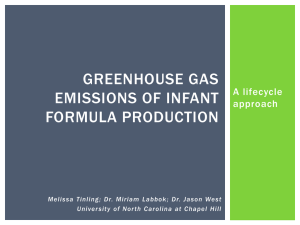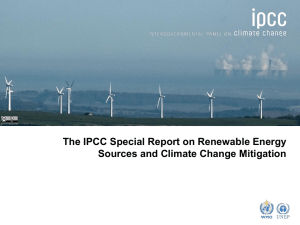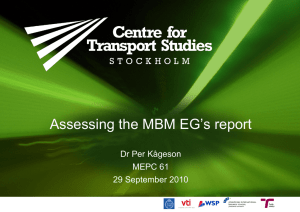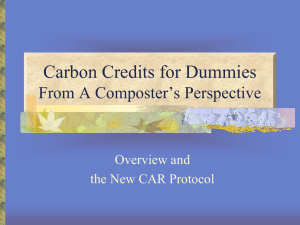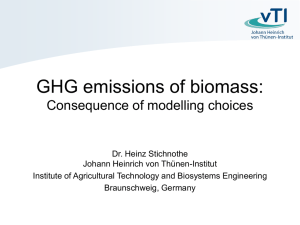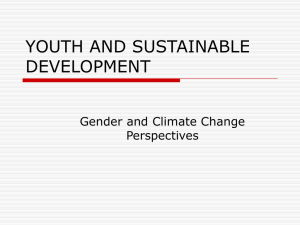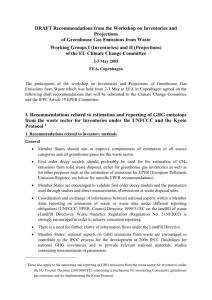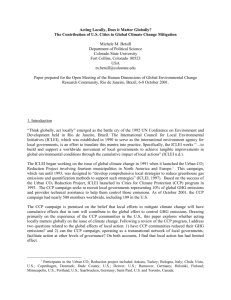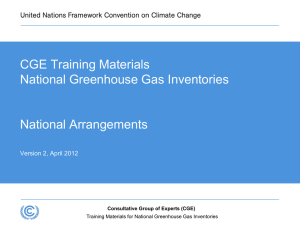ESD Review tool KO meeting - Eionet Projects
advertisement
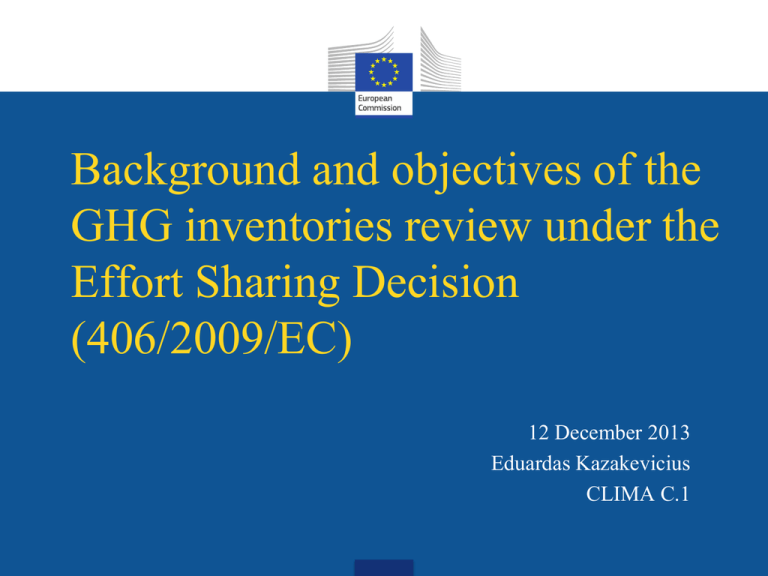
Background and objectives of the GHG inventories review under the Effort Sharing Decision (406/2009/EC) 12 December 2013 Eduardas Kazakevicius CLIMA C.1 What's the ESD? The Effort Sharing Decision (ESD, 406/2009/EC) establishes binding annual greenhouse gas (GHG) emission targets for Member States (MS) for the period 2013–2020. The ESD targets concern emissions from most sectors not included in the EU Emissions Trading System (EU ETS), such as transport (except aviation and international maritime shipping), buildings, small industry and services, agriculture and waste. Emissions from land use, land use change and forestry (LULUCF) are not included. The ESD currently covers about 60% of the EU GHG emissions (all 6 Kyoto gases: CO2, CH4, N2O, HFCs, PFCs and SF6 ). The ESD targets for each year - Annual Emissions Allocations (AEAs) in tons of CO2 equivalent for each MS – were established after the 2012 review of GHG inventories and are set by the Commission Decisions 2013/162/EU and 2013/634/EU. More information: http://ec.europa.eu/clima/policies/effort/index_en.htm How Member State compliance will be checked? Due to lengthy statistics collecting process MS report their GHG emissions with 2 year delay, i.e. inventories for the year 2013 will be first submitted in January 2015. From 2015 onwards each year the Commission will be comparing greenhouse gas emissions with the AEAs to monitor MS compliance. The ESD emissions = Total reviewed emissions – ETS verified emissions – Domestic aviation emissions Total reviewed emissions will be established after reviewing MS annual greenhouse gas inventories in a consistent, transparent and timely manner. ETS verified emission figures will be taken from the EUTL registry. As 1 ton of CO2 eq. difference can make a MS non-compliant , establishing a precise quantity of GHG emissions is very essential. Therefore the review process is an important element of the ESD implementation. What will be reviewed? National Inventory Submissions 2013: http://unfccc.int/national_reports/annex_i_ghg_inventories/national_invent ories_submissions/items/7383.php GREENHOUS E GAS S OURCE AND S INK CATEGORIES Total Energy A. Fuel Combustion Activities (S ectoral Approach) 1. Energy Industries a. Public Electricity and Heat Production b. Petroleum Refining c. M anufacture of Solid Fuels and Other Energy Industries 2. Manufacturing Industries and Construction a. Iron and Steel b. Non-Ferrous M etals c. Chemicals d. Pulp, Paper and Print e. Food Processing, Beverages and Tobacco f. Other (as specified in table 1.A(a) sheet 2) Other non-specified 3. Transport a. Civil Aviation b. Road Transportation c. Railways d. Navigation e. Other Transportation (as specified in table 1.A(a) sheet 3) Pipeline transport CO 2 60.830,19 60.597,01 13.861,09 10.492,24 2.768,08 600,77 14.827,78 5.752,05 242,48 1.263,66 2.035,38 861,40 4.672,81 4.672,81 21.523,38 61,83 20.908,97 148,08 11,34 393,16 393,16 N2O CH4 22,17 10,71 0,43 0,41 IE,NO 0,02 0,71 0,09 0,01 0,09 0,15 0,02 0,36 0,36 0,64 0,00 0,61 0,01 0,00 0,01 0,01 2,23 2,23 0,38 0,36 0,02 0,00 0,50 0,05 0,00 0,02 0,08 0,00 0,34 0,34 0,69 0,00 0,63 0,05 0,00 0,00 0,00 NO X (Gg) 173,95 173,95 13,58 11,06 0,90 1,63 32,28 4,32 0,21 1,30 5,06 0,78 20,61 20,61 106,56 0,21 103,56 1,66 0,06 1,06 1,06 CO 578,36 578,36 5,74 5,32 0,31 0,11 153,23 120,85 0,04 1,33 2,14 0,13 28,75 28,75 145,46 3,61 138,09 1,46 2,23 0,07 0,07 NMVOC 48,29 46,36 0,95 0,95 IE 0,01 2,44 0,27 0,00 0,22 0,25 0,01 1,69 1,69 13,03 0,13 12,37 0,25 0,27 0,00 0,00 S O2 17,18 16,94 2,96 2,52 0,44 NA 11,32 5,10 0,08 0,56 1,09 0,20 4,29 4,29 0,21 0,02 0,13 0,06 0,00 NA NA When the reviews will take place? In the years 2015 and 2017 – 2021 there will be annual reviews of GHG inventories organized in 2 steps. The 1st step of annual reviews will commence on 15th of January and should be completed by 15th of April of each year. The 2nd step for some MS will commence on 15th of April and should be completed by 30th of June. In the years 2016 and 2022 there will be comprehensive reviews. The comprehensive reviews will start on 15th of January and will be completed by 23rd of August. To have the review system running by 15th of January 2015 we need to meet the deadlines set by the contract. What institutions are involved in the review of GHG inventories? The GHG inventory reviews will involve: DG CLIMA The EEA Review secretariat + EEA inventory team + EEA IT team ETC / ACM Technical expert review team (TERT) Representatives + GHG inventory experts of 28 MS DG CLIMA has < 2 persons dealing with the ESD implementation full time therefore we rely on technical expertise and resources of the EEA, as result both institutions are involved in the project. Why the Review Tool is needed? During the 2012 comprehensive review of inventories for setting the AEAs information exchange was based on e-mails, but this extensive communication (> 1000 e-mail exchanges) was challenging and resource intensive from all involved sides. We need an effective and user friendly communication tool to manage this information flow during the future reviews. And therefore we contracted Bilbomatica to develop a Review Tool! What are the project objectives? develop and maintain an electronic information system, the Review Tool (RT) to facilitate the future internal EU reviews of greenhouse gas emission inventories and assist the management of the annual review process by ensuring a transparent and accurate review process for Member States and the European Commission. assure reliable entry and cataloguing of review findings and questions identified in the course of the review allow the communication of questions to Member States and record their replies. The contractor shall develop the Review Tool within the operational IT environment of the EEA.
